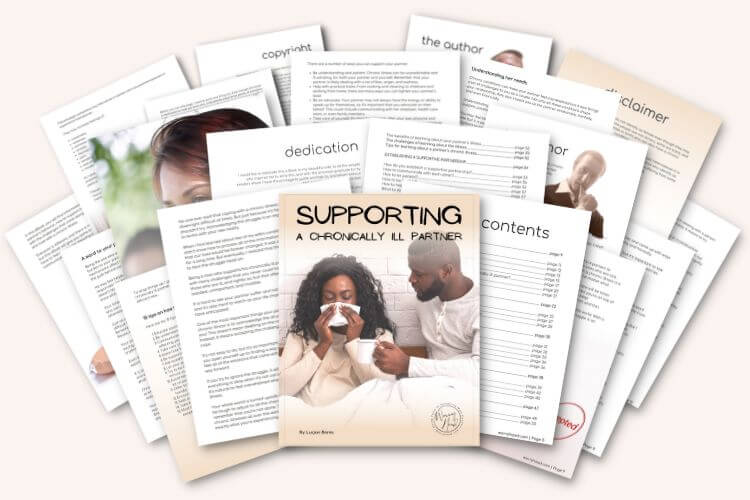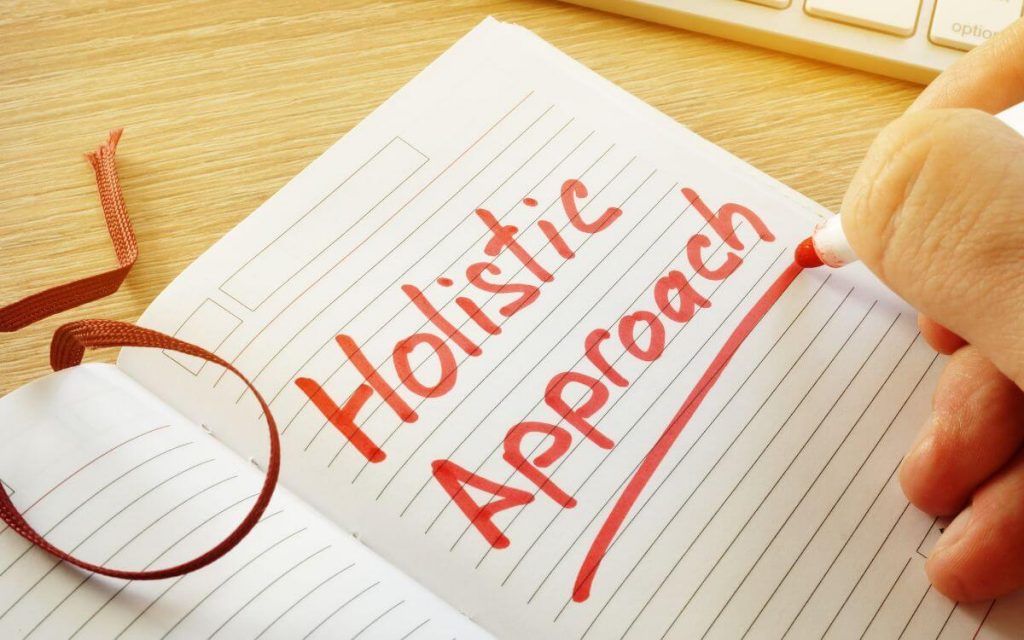Holistic approach.
I began to prioritize the holistic approach to certain conditions after my wife was diagnosed with endometriosis and fibromyalgia. During my research for my blog, I found that a holistic approach was more effective than any medication my wife took.
I am not saying that taking medication is wrong, I just believe that holistic medicine has fewer side effects than traditional medicine.
I found this to be true with my wife’s general anxiety, obsessive-compulsive disorder (OCD), and depression.
In addition, unlike traditional medicine, the holistic approach treated her as a whole person, not like a number in the medical system.
- What is a holistic approach?
- My wife's health.
- Understanding the whole person.
- Benefits of a holistic approach to mental health.
- The core of holistic thinking.
- A holistic approach to work-life balance.
- What is the key to embracing a holistic approach?
- Traditional medicine and holistic health.
- Common misconceptions about a holistic approach.
- Conclusion on the holistic treatment of mental health condition.
What is a holistic approach?
A holistic approach is a method of understanding and addressing a situation or problem by considering all aspects of a person or system, including physical, emotional, social, and environmental factors, as interconnected and interdependent.
This is very true when it comes to physical as well as mental health conditions.
My wife’s health.
When it comes to my wife’s health, her stage 4 endometriosis diagnosis was enough to affect her mental health. But the following year, she was also diagnosed with fibromyalgia disorder.
Throughout the diagnosis process, doctors always blamed her symptoms on mental illness, blaming her real physical pain on anxiety and depression. She never had accurate support as a patient.
Her spiritual and mental wellness went downwards because of the disbelief of doctors, and that included some mental health professionals.
She used to be a dancer, but her lifestyle completely changed when her body began to fail, and her healthy life became a life filled with physical health and mental health problems. She began to live a life filled with treatment after treatment and followed by more treatment.
If you want more in-depth information about how to support your partner with her chronic conditions and how to cope with the new normal in your relationship, I wrote a “Supporting a Chronically Ill Partner” e-Book.
You can get the 1st Chapter of the e-Book for FREE, and if you like it, you’ll get a Whopping 33% Discount on the Whole Book, plus discounts on other helpful tools. You have nothing to lose but a lot to gain!
The first chapter alone contains a lot of information for both of you about acknowledging the struggles, including:
- A word to your partner.
- A word to you.
- Stepping on eggshells.
- Understanding her needs.
- How to acknowledge having a chronically ill partner?
- Acknowledging can be hard.
- 15 tips on how to do it!
Get the 1st Chapter FREE!
Chronic Illness for Partners

Understanding the whole person.
In order to understand a person as a whole involves recognizing that individuals are complex beings with multiple interconnected factors that contribute to their well-being. These aspects may include physical symptoms, mental health, emotional, spiritual, social, environmental, and lifestyle factors.
To truly understand someone, a holistic approach considers all of these factors and how they interact with one another. For example, mental health conditions may impact physical health outcomes and vice versa.
Benefits of a holistic approach to mental health.
There are many benefits of the holistic care approach, some of these include the following:
- Improved health and well-being.
- Increased self-awareness.
- Reduced stress and anxiety.
- Improved coping skills.
- Enhanced self-care.
- Increased sense of purpose and meaning.
- Improved relationships.
- Greater sense of empowerment.
- Improved sleep.
- Increased resilience.

The core of holistic thinking.
When it comes to balancing multiple perspectives in treating a chronic illness and its mental health impact, there is a difference between western medicine and holistic treatment. Unlike traditional medicine, holistic treatments don’t give you side effects.
My wife copes better without antidepressants, hormones, and painkillers while managing her endometriosis and fibromyalgia, but also the mental health conditions she developed after her diagnosis.
Her mental health problems were the outcome of endometriosis and fibromyalgia. The mental health issues include anxiety, OCD, and depression.
The role of empathy and active listening in holistic thinking.
I had to learn how to help my wife with her treatment plan and lifestyle changes, reduce stress and provide support for her mental health and overall health.
It wasn’t always easy for me. Sure, empathy comes easy because I’m a compassionate man, but I am not a doctor, and I had to learn everything myself.
The mind-body connection.
The mind-body connection refers to the idea that the mind and body are interconnected and can influence each other in many ways. A holistic approach recognizes the importance of this connection and aims to address health and wellness from a whole-person perspective.
Physical health and mental health condition are both included in the idea. By recognizing the mind-body connection, a holistic approach can promote overall health and wellness by taking into account the interconnectedness of physical and mental health conditions.
How a holistic approach supports mental health?
Holistic health supports emotional health by recognizing the interconnectedness of physical and mental health conditions and addressing both through strategies such as mindfulness, meditation, talk therapy (CBT), exercise, and nutrition.
Mindfulness.
Mindfulness is the practice of being present and fully engaged in the current moment that you are in. You need to pay attention to your thoughts, feelings, and bodily sensations without any judgment.
You need to focus on experiencing the present moment rather than dwelling on the past or worrying about the future. It can involve simple activities such as deep breathing or yoga. My wife often performs deep breathing in bed, but she also loves doing pilates.
Both help her manage stress and level her spiritual wellbeing. This has significant benefits for her mental health while reducing symptoms of stress and anxiety.

A holistic approach to work-life balance.
A holistic approach to work-life balance recognizes the interconnectedness of various aspects of life such as physical, emotional, mental, and social, and the importance of finding a balance between them.
Here are some key aspects of a holistic approach to work-life balance:
- Prioritizing self-care.
- Setting boundaries.
- Identifying personal values and goals.
- Fostering supportive relationships.
- Emphasizing flexibility and adaptability.
- Addressing environmental factors.
Holistic care helps overall well-being by recognizing a balance between work and personal life.
What is the key to embracing a holistic approach?
The key to embracing a holistic approach is to recognize and embrace the interconnectedness of various aspects of life and life experience, but also to approach health in a comprehensive and integrated manner.
Traditional medicine and holistic health.
Medication vs meditation. Sounds funny, but that is how I see this.
My wife’s chronic pain and other symptoms of endometriosis and fibromyalgia cause her a lot of anxiety and depression. Depression is usually treated with antidepressants, however, they always made her feel worse.
Not only feeding her antidepressants via conventional medical treatment brings an increased risk of unwanted side effects, but they also contradict the treatment of endometriosis because she is already chronically fatigued, and her fibromyalgia treatment is also affected in the same way.
By giving her medication, she wouldn’t be able to focus, or even get out of bed, but her chronic pain would still remain.
This is where pilates, yoga, tai chi, or reduced alcohol use is a way better mental health treatment plan and helps to reduce mental health symptoms without side effects.
Common misconceptions about a holistic approach.
Most doctors and society, even some family members believe, that the only way to mental health treatment is through medication. They never even consider holistic approaches to treating mental health.
But every person’s life is different, and they shouldn’t be seen as a number in the medical system.
This is where a more holistic approach has its benefits. I don’t discourage people from using conventional medicine, I just believe that any patient benefits from the combination of both.
There are misconceptions about the holistic treatment I would like to address. Here are the most common five:
- A holistic approach is only for alternative or complementary medicine.
- A holistic approach is not evidence-based.
- A holistic approach is all about natural remedies.
- A holistic approach is only for people with chronic illnesses.
- A holistic approach is time-consuming and expensive.
Conclusion on the holistic treatment of mental health condition.
If someone suffers from a chronic condition that is invisible to others, they aren’t mental. No patient should be seen as mental. Mental health can be only more damaged by such remarks.
Every patient should be treated fairly. The mental health impact is usually an outcome of other underlying health conditions or childhood trauma. Patient outcomes could be better if they were seen as unique, not as a number.
Stay well!


About Me
Hi, I’m Lucjan! The reason why I decided to create this blog was my beautiful wife, who experienced a lot of pain in life, but also the lack of information about endometriosis and fibromyalgia for men…
